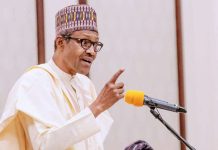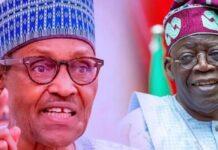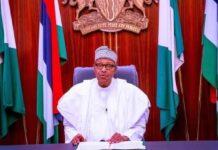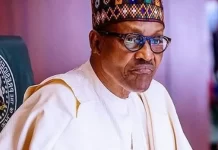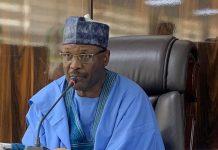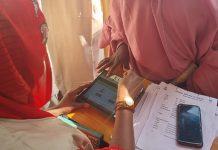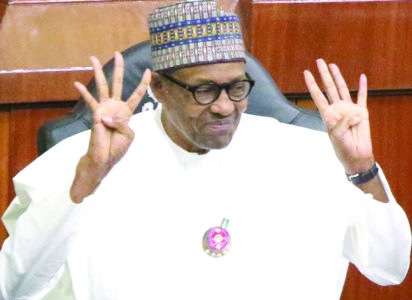
That Muhammadu Buhari of the APC, having satisfied the requirement of the law and scored the highest number of votes is hereby declared the winner and is returned elected. #NigeriaDecides2019Result pic.twitter.com/oz89PAz1QM
— INEC Nigeria (@inecnigeria) February 27, 2019
All Progressives Congress’s Muhammadu Buhari has been re-elected as Nigeria’s president for another four-year term after facing stiff competition from his closest challenger Atiku Abubakar of the People’s Democratic Party.
Buhari was declared the winner of the election in Wednesday morning, more than three days after voting closed in most of the polling centres.
Abubakar, a former ally of President Buhari, led a motley pack of challengers, most of whom posed no serious obstacle to Buhari’s re-election.
Observers said killings, malpractices and attacks on electoral officials marred the elections which held a week after it was earlier scheduled.
In the final tally announced by the Chairman of the Independent National Electoral Commission, Prof Mahmood Yakubu, Buhari polled 15, 191, 847 votes while Abubakar, a former Nigerian vice president between 1999 and 2007, got 11, 262, 978 votes.
The bulk of Buhari’s numbers came from the North where he has a cult following.
Both Buhari and Atiku are from the northern part of Nigeria. Analysts had predicted before the elections that being northern Muslims, the two front runners will share the votes from the region.
But Buhari’s popularity in Kano, his native Katsina, insurgency-ravaged Yobe and Borno states, and Zamfara was too much for PDP’s Atiku to contend with.
The president also won in four out of six states in Southwest, a traditional stronghold of the APC, and four states in the country’s north-central which many believed will swing towards the opposition.
APC’s victory in the region consumed Nigeria’s Senate president Bukola Saraki’s dream of returning to the Red Chamber for another term as he lost his seat to APC’s Ibrahim Oloriegbe.
But Atiku’s party rejected the results of the elections even before Buhari was declared the winner, accusing the electoral body of colluding with the ruling All Progressives Congress to rig the election.
PDP’s national chair Uche Secondus said on Sunday that Atiku was in the lead based on the results collated by its agents across the country.
The same case was made by the party’s agent at the national collation centre Osita Chidoka.
“All results currently being announced by the Independent National Electoral Commission (INEC) is incorrect, thus unacceptable to our party and people,” Secondus told a press conference hours after INEC started the official collation of the results.
“As results trickled in on Sunday, February 24th, 2019, clearly putting the PDP in the lead, the ruling party and President Buhari dispatched high-ranking officials to coercively influence outcomes in different geopolitical zones in the country.”
The PDP is contesting APC’s victory in four northern states and demanded that fresh elections be held in those states.
“We demand the immediate and outright cancellation of Presidential election results in Yobe, Zamfara, Nasarawa and Borno states as submitted by INEC presiding officers and ask for the conduct of fresh elections in these states,” PDP’s deputy director general of Presidential Campaign Organization Tanimu Turaki said in a statement.
Controversies and malpractices
The elections were characterised by killings and outright violent attacks against electoral officials at different locations in the country.
A few returning officers told INEC chief at the National Collation Centre on Tuesday that some officials were attacked.
The Cross River State resident electoral commissioner told The Guardian on Sunday that 18 members of the National Youth Service Corps who served as ad-hoc workers during the election were kidnapped. 14 of them, he said, were released afterwards. The police in the state said it was not aware of the kidnappings.
In Lagos, polling units were attacked by political thugs in areas where they believed would jeopardise the chances of their supported parties.
Ballot boxes and papers were either destroyed or dubiously thumb-printed in some instances.
More than a dozen people were killed in violent clashed in oil-rich Rivers State where APC contested only in the presidential election.
The Situation Room, an umbrella group of more than 70 civil society organisations, said at least 39 persons were killed during the Saturday polls.
“Situation Room reiterates that no election in Nigeria should cost the life of any citizen and condemns in the strongest terms the lack of empathy, concern and sensitivity by the police class regarding these events,” it said in a statement.
16 persons were suspected killed in Rivers, four in Bayelsa and two in Delta state. There were also confirmed fatalities in Kogi and Oyo State.
Cancellations:
The executive director of the Policy and Legal Advocacy Centre and the convenor of the Situation Room Clement Nwankwo said the way votes were cancelled in polling units across the country lacked transparency.
“There is a lack of clarity in the rationale for cancellation of polls,” Nwankwo said on Tuesday.
“We have recorded 1,084,358 cancelled votes across 1,175 polling units in 18 States, The pattern of this cancellation requires some close interrogation to show fairness and objectivity.”
The task ahead:
President Buhari was elected in 2015 on the back of his promises to fix the economy, fight corruption and strengthen security.
His critics said much has not been done over the four years of his first tenure.
The country fell into a biting recession in 2016, owing in part to falling oil prices.
Fatal clashes between farmers and herders remained unchecked until recent months.
Kaduna, Zamfara and Buhari’s home state of Katsina, have been in the throes of armed bandits. Boko Haram, insurgents in the Northeast, have stepped up against military formations in recent months.
Critics also accused Buhari of being selective in his war against corruption. They claim prosecutions in the anti-graft war has been targeted at the opposition party.
But he has consistently said that his government has done much with fewer resources compared to past administrations.
Regardless, when he is sworn in on May 29, the people of Africa’s biggest democracy will expect their president to make the country better than it has been in the past four years.
To Advertise or Publish a Story on NaijaLiveTv:
Kindly contact us @ Naijalivetv@gmail.com
Call or Whatsapp: 07035262029, 07016666694, 08129340000


